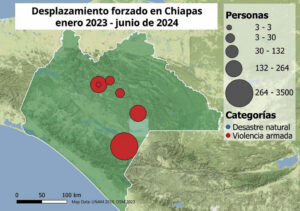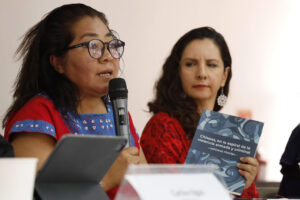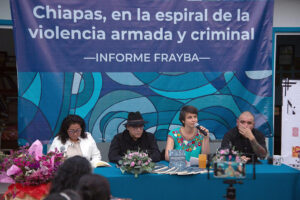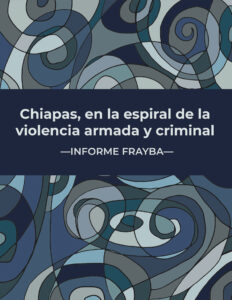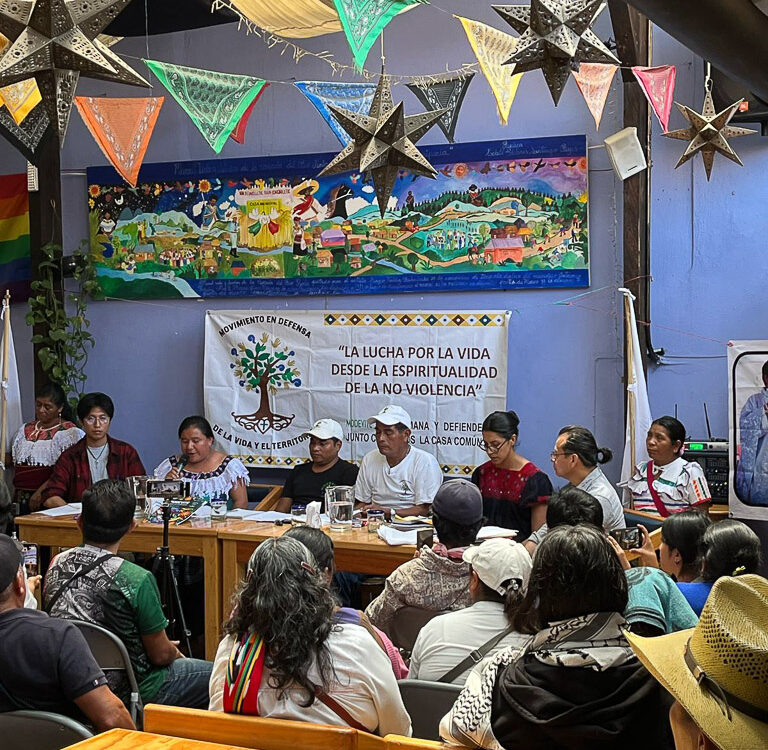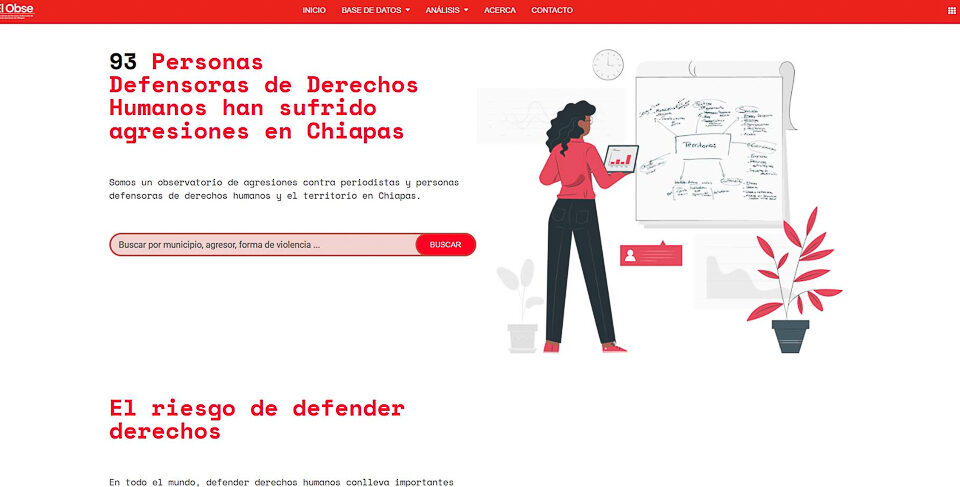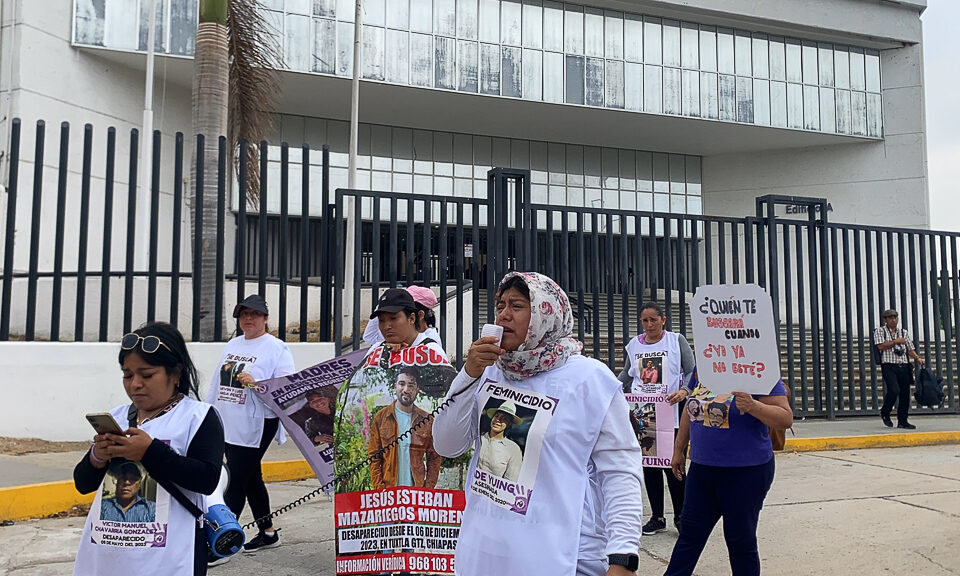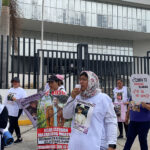
LATEST: Mexico Faces Multiple Human Rights Challenges amid Global Instability
11/06/2025
ARTICLE: Documenting to Make Visible – El Obse de Chiapas Confronting Violence Against Human Rights Defenders
11/06/2025“Our pens become swords,
our verses fight against oppression.We shout to the entire world: Enough violence!
because we deserve to live in peace and dignity”.Juana de Ibarbourou
O n March 19th, in the framework of its 36th anniversary, the Fray Bartolome de las Casas Center for Human Rights (Frayba) presented its report “Chiapas, in the Spiral of Armed and Criminal Violence (Between Governmental Chaos, Organized Crime and the Paths of Struggle and Resistance)”, which aims to leave a record of what happened in the state during the period from January 2023 to June 2024. Based on documentary data from direct sources, it analyzes the context in which resistance movements and alternative processes are fighting against structural and criminal violence, as well as the main human rights violations they suffer.
Forced Displacement: An Omnipresent Open Wound in Chiapas
In Mexico, various forms of violence have reached alarming levels, resulting in serious human rights violations. This situation is exacerbated by factors such as corruption, marginalization, impunity, and ineffective mechanisms for access to justice. These conditions lead to people being forced to leave their places of origin.
In Chiapas, one of the states historically most affected by this problem, families not only experience the pain of leaving their homes, their belongings, and the land on which they live, but they must also see their families and communities separated, seriously impacting their physical and mental health as well as their way of life. They are often forced to start over in hostile environments. In its report, Frayba documents 20 Internally Forced Displacement (IFD) events, with approximately 15,780 victims of this phenomenon. These individuals are originally from the municipalities of Pantelho, Frontera Comalapa, Chicomuselo, Oxchuc, Las Margaritas, Huixtan, Chenalho, Ocosingo, La Trinitaria, Socoltenango, La Concordia, Bella Vista, and Tila. In the Frontera y Sierra region of the state alone, 8,190 people have been displaced by organized crime (OC).
Between June 2024 and May 2025, the silenced zones imposed by criminal violence, widespread distrust of authorities, and the disintegration of the community fabric have made it difficult for organizations like Frayba to directly contact families and obtain an accurate number of displaced people. From the outset, these events caused people to disperse rather than concentrate them in a single location: some sought refuge with family or friends in urban areas, others survived by renting spaces or even living on the streets, which has made locating them and monitoring their cases very difficult.
Furthermore, it has been documented that some people trying to return to their territories currently have to pay fines ranging from 50,000 to 100,000 pesos, amounts difficult to obtain for people who have experienced forced displacement and have not had access to healthcare, education, or a decent life. Guarantees for a safe and dignified return do not exist. While police-military operations have been deployed, they are not permanent and are not addressing the underlying situation: that is, the criminal groups that continue to maintain a presence and control in the territories to this day are not being disarmed or dismantled.
Missing Persons in Chiapas: A Growing Problem
In November 2023, Frayba released the report “Touching the Void”, which addresses the growing problem of missing persons in Chiapas. According to the data presented, between 2019 and 2023, cases of forced disappearance in the state had increased by 358%. This is mainly due to the intensification of territorial disputes between criminal groups, which seek to exert control over the social, economic, and political life of communities, using fear as a tool to curb any form of social organization or territorial autonomy. Although this phenomenon is not new in the country, it is now becoming more prevalent in Chiapas, particularly in the Sierra and Border regions.
Of particular concern is the disappearance of women in the state, which is much higher than the national rates, far exceeding the national average of 25% and reaching more than 60%, mostly affecting girls and adolescents. Many of these disappearances are due to trafficking and sexual exploitation.
The situation of children and adolescents facing this phenomenon is equally alarming. The most common age for disappearances is 15 years old, and adolescent girls are the most frequently reported missing. Another detail that speaks to the serious situation in Chiapas is that, nationally, two out of every ten people in this age range remain missing, but in the state, this figure rises to three out of every ten. The most affected areas are Tuxtla Gutierrez, San Cristobal de Las Casas, Tapachula, Comitán de Dominguez, and Palenque. According to the Network for the Rights of Children and Adolescents in Chiapas (REDIAS), between 2020 and 2024, the number of missing children and adolescents was 2,223. That is, an average of 1.5 disappearances of minors per day.
Continuing Attacks on Human Rights Defenders and Journalists
“The defense of human rights, the fight for truth and justice, turns those involved into targets for attacks by various actors. On many occasions, the justice system itself is used to place obstacles in the way of activists. Thus, in Chiapas, as in previous years, we observe the criminalization of people who, through their demands and struggles, stand in the way of the interests of both the State and other private actors, both legal and illegal,” the report states, giving several examples of this trend.
It must also be recognized that due to the constant fear of reporting and the impunity that characterizes these events, for every attack made public, there are countless cases that never come to light.
Defenders of land and territory are among the most affected, and the level of severity of the attacks is often greater. An example of this was the massacre that occurred in Nueva Morelia, municipality of Chicomuselo, on April 12th, 2024, against 11 people, including a family whose members had opposed criminal violence and mining exploitation. As the Diocese of San Cristobal de Las Casas emphasized in its statement following the events, this territory has been devastated “by the violence generated by the control of the territory and the latent interest in continuing mining exploitation by criminal groups that have operated with total impunity.”
Religious leaders have also been targets of attacks. In the most serious cases addressed by the report, on October 20th, 2024, the priest Marcelo Pérez Pérez, a human rights defender and peacebuilder, was extra-judicially executed in San Cristobal de Las Casas, despite having received precautionary measures from the Inter-American Commission on Human Rights (IACHR).
Communicators and journalists have also seen their scope of action limited due to the increase in violence. Journalist Angeles Mariscal stated that “what we are experiencing in Chiapas is one of the worst instances of violence that, at least I have experienced in more than 20 years of journalistic experience. This may not be possible to put into figures; perhaps other parameters for measuring violence should be used, but there is no doubt that these conditions mean that in Chiapas we are experiencing one of the worst moments in terms of freedom of information and expression.”
Defending the right to migrate is also a source of aggression. Criminal organizations operating in Chiapas use human trafficking, specifically that of people on the move, as one of their main sources of income. Those who dare to defend the dignity of people on the move and denounce human rights violations and violence against them find themselves in the sights of violent criminal organizations. Unfortunately, on more than one occasion since the beginning of 2023, threats against them have materialized. Frayba itself, like other organizations, human rights defenders, and journalists, has been the target of multiple security incidents, along with the disparaging remarks of former President Andres Manuel Lopez Obrador (AMLO) during his morning press conferences. This is of utmost concern, as these types of accusations reach an extremely broad audience, potentially influencing the rest of society. All of this reduces the political cost of threats or potential attacks against Frayba, other organizations, human rights defenders, and, in general, organized civil society.
Criminal Violence and Impact on the Population
The report recounts the increase in criminal presence in the state, particularly in the border area, and the growing control of key areas for controlling routes for human trafficking, drug trafficking, and the illegal exploitation of natural resources, among others. This has gone hand in hand with the capture of civil and organizational structures; the formation of their own organizations; and the usurpation of local power structures, including community, communal, and municipal structures, in order to determine the election of their representatives.
Among other forms of control, in addition to the impact of direct confrontations between criminal groups, recruitment strategies have been identified—both persuasive and forced; sexual violence; control and restriction (narco-blockades); and the restriction of services and shortages as a form of pressure. “While much of the attention has focused on the border with Guatemala, the trend is toward the expansion of the conflict and, with it, the transfer of population control methods to other regions, in an attempt to open and maintain routes for crime,” Frayba warned.
“To date, it is impossible to quantitatively estimate the social impacts of these disputes. Thousands of displaced people remain anonymous out of fear, still afraid to share their testimonies, with no sign of interest from the State. Cases of disappearances, murders, sexual violence, or recruitment follow a similar path. All of this also causes serious psychological effects on the same population with consequences for the social fabric,” it also denounced.
The Continuity of the War Against Indigenous Peoples
The report raises several trends, sources of concern, that continue to outline a continuity in the war strategy against Indigenous peoples in the territories where Frayba operates.
It affirms that the pact of impunity persists in cases of human rights violations, and that a “deliberate” absence of government structures is observed, allowing organized crime to expand its territorial control. “This action is carried out premeditatedly, tolerated, and in complicity with the institutions,” it denounces. It also states that, during the period covered by the report, the armed forces played the role of mere observers of the attacks against indigenous peoples, while non-state actors, such as the DO, exerted their power and created a climate of fear and terror among the population. The report also analyzes the continued territorial dispossession of indigenous communities, with the modernization of neoliberal projects such as The South Also Exists, Puebla Panama Plan, and the Mesoamerica Project, which have gone hand in hand with the criminalization of those who fight against these megaprojects.
It points to the use of social programs as a clientelist tool to avoid resistance. These programs “have a completely individualistic and capitalist domestication perspective, and they confront forms of collective organization and community assemblies in the decision-making process of the communities where they decide on their life plans.” This has led to the destruction of community organization and further fractures in the community fabric.
A Still Uncertain Future
The report covers the period prior to the changes in government at the state level (with the arrival of the new governor Eduardo Ramirez Aguilar) and the federal level (with Claudia Sheinbaum). It highlights the major issues that the new authorities will have to address.
In the press conferences and media interviews through which Frayba presented the report, the Center shared some reflections on the strategic changes brought about by the changes in government: “For us to be able to live peacefully in the territories, to have a dignified life, and security for the peoples and communities, something more than militarization and the creation of special police-military groups is necessary,” Frayba stated. It also stated: “It is important to emphasize that there will be no peace until armed groups linked to organized crime, linked to power groups that have been entrenched for decades in the state of Chiapas, are dismantled, prosecuted, and disarmed. (…) Peace is not a pause and a respite with fewer confrontations; it is about building processes of justice.”
“In underground rivers, the paths to freedom always meet.”
In its report, despite the complexity and violence of the context, Frayba has not lost hope for another kind of horizon and suggests some paths toward it: “The crucial point is to generate conditions for peace, so that communities can return to living their daily lives peacefully, so that they can continue and build their life projects, based on their culture and identity, for a peace that walks, that moves, that transforms, that spirals, that permeates the most remote corners of the territory.”
To achieve this, it states: “What is essential is to promote open organizational capacity, to reclaim the spaces ceded by fear. There are many ways to defend life in the territories. (…) What is essential is the reconstruction of the community’s social fabric.”
It details several paths to achieve this: building different relationships based on dignity, mutual respect, and justice; having principles of non-polarization, not generating divisions in our environments; promoting dialogues with listening and the construction of collective thinking; recognizing diversity as a source of richness in human relationships; rebuilding processes of trust and social cohesion; coming together through acknowledgment of differences in political action to promote open, far-reaching movements to recover our humanity; fostering harmony and embracing Lekil Cuxlejal, the “good life” in Tseltal, for all.

